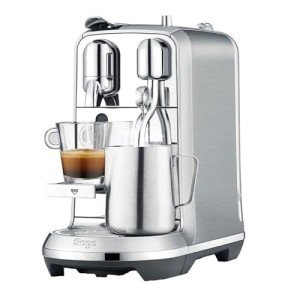What's Holding Back From The Commercial Espresso Machines Industry?
The Rise of Home Espresso Machines: A Comprehensive Guide
As coffee enthusiasts continue to seek fresh and delicious brews in your home, the appeal of home espresso machines has risen in current years. No longer just the domain of cafes and coffee shops, these machines empower individuals to craft barista-quality espresso beverages from the comfort of their kitchen areas. This post will check out the numerous kinds of home espresso machines, their features, and factors to consider for selecting the right one. In addition, it will supply a choice of FAQs to assist potential buyers make informed decisions.
Kinds Of Home Espresso Machines
Home espresso machines can be categorized into a number of categories based on their mechanisms and user-friendliness. Each type has its special functions, pros, and cons.
Type
Description
Pros
Cons
Manual Espresso Machines
Requires the user to by hand control the brewing procedure, including techniques like pulling a lever to produce pressure.
- Complete control over brewing process
- Compact design
- Requires ability and practice
- Time-consuming
Semi-Automatic Machines
Machine automates water circulation and pressure, but the user still controls the dosing and duration of the brewing procedure.
- Balance of automation and control
- Versatile
- Learning curve for perfecting strategies
Fully Automatic Machines
Automates the entire developing process, from grinding to brewing, frequently with programmable settings for customized drinks.
- Extremely user-friendly
- Quick and practical
- Less control over the developing process
- Higher cost point
Capsule or Pod Machines
Uses pre-packaged espresso capsules or pods to develop coffee rapidly and quickly.
- Extremely easy to use
- Minimal clean-up
- Limited flavor range
- More expensive per cup than ground coffee
Super-Automatic Machines
Integrates functions of totally automatic machines with integrated mills, allowing users to brew whole bean espresso and milk-based drinks with one touch.
- All-in-one benefit
- Ideal for milk-based drinks
- Often the most costly
- Can be bulky
Features to Consider
When selecting a home espresso machine, possible purchasers need to consider the following features to guarantee they choose a machine that satisfies their needs:
Grinder Type:
- Built-in grinders can provide fresher premises however may need more maintenance.
- Separate mills permit for more modification of grind size.
Pressure:
- Look for machines that produce a minimum of nine bars of pressure, which is ideal for brewing espresso.
Water Temperature Control:
- Machines with adjustable temperature level settings allow for better extraction of flavor from beans.
Milk Frothing Options:
- Consider whether you desire a manual steam wand for frothing or an automatic milk frother for convenience.
Reduce of Cleaning:
- Machines with removable parts and self-cleaning functions significantly lower cleanup time.
Size and Design:
- Ensure the machine fits comfortably in your kitchen and lines up with your visual choices.
Budget:
- Set a budget before beginning your search, as costs can vary considerably from affordable designs to high-end machines.
Benefits of Home Espresso Machines
Owning a home espresso machine provides many benefits:
- Cost-Effective: Over time, developing espresso at home can save coffee lovers cash compared to frequent café check outs.
- Modification: Users can experiment with various beans, grind sizes, and brewing techniques to find their ideal cup.
- Convenience: The ability to brew espresso at any time gets rid of the need to head out to a café, specifically helpful throughout late nights or early mornings.
- Quality assurance: With a home machine, people have total control over the quality of active ingredients and brewing processes.
Drawbacks of Home Espresso Machines
However, there are some disadvantages to think about:
- Initial Investment: High-quality espresso machines can be pricey, requiring a substantial upfront investment.
- Knowing Curve: Mastering the art of espresso developing can take some time and practice, which might be daunting for beginners.
- Upkeep: Like any home appliance, espresso machines need routine cleansing and maintenance to guarantee optimal performance.
FAQs
1. What is the very best kind of home espresso machine for novices?
Response: For novices, a semi-automatic machine is typically suggested as it uses a balance between control and automation, enabling you to learn the basics without frustrating complexity.
2. Just how much should I invest in a home espresso machine?
Response: Entry-level machines can begin around ₤ 100 to ₤ 300, while higher-end models can range from ₤ 500 to over ₤ 2000. It's vital to set a budget based upon your anticipated use and wanted features.
3. Do I require a different grinder?
Response: While some espresso machines feature built-in grinders, investing in a different grinder permits higher modification and makes sure better quality grounds.
4. How typically should I clean my espresso machine?
Answer: Cleaning frequency can differ by machine type, however it's typically recommended to clean up the machine after each use and carry out deep cleanings weekly or month-to-month, depending upon use.
5. Can I make milk-based drinks with any espresso machine?
Answer: Not all machines come with milk frothing capabilities. If Espresso Machines With Milk Frother enjoy drinks like lattes or cappuccinos, search for a machine with a steam wand or automatic frother.
Home espresso machines are transforming the way coffee connoisseurs enjoy their cherished brews. With numerous types and advanced features available in the market, there is something for everyone. Whether it's the joy of creating unique recipes or simply savoring the perfect shot of espresso, purchasing a home espresso machine can boost both the coffee-drinking experience and the lifestyle for coffee lovers everywhere. Similar to any investment, it is vital to weigh the benefits against the potential downsides and choose a machine that effortlessly fits both your way of life and choices.
